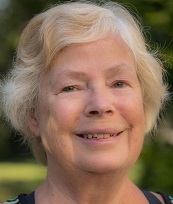Member profiles
Our latest member profiles explore the working lives of associate professor of biomedicine and pharmacology Dr Bernadine Idowu MRSB; DEFRA development programme manager Dr Jamie McFadzean MRSB; and professor of life sciences, Hilary Macqueen CSciTeach FRSB
- These profiles appeared in the Autumn 2022 issue of The Biologist (Vol 69 No 3)
A Day in the Life
Associate professor Dr Bernadine Idowu MRSB on her efforts to increase the number of black students going on to academic careers

My alarm goes off… at 6am, and as a woman of faith I start the day with a prayer.
My work involves… ensuring our two courses run smoothly. I am the course leader for both Biomedical Science and Pharmacology within our new school of Biomedical Sciences at the University of West London. I felt so privileged to be invited to be part of this once in a lifetime project which included developing inclusive curricula.
On a typical day… well, this is where prayer comes in! If I am not teaching on my module(s), I am involved in a lot of activities which I thoroughly enjoy. As the course leader I receive copious numbers of emails, from students or staff or various committees I sit on or chair. I am working on initiatives to improve student experiences and I am also the lead personal tutor.
Right now…I am preparing for my sixth annual Black Minority and Ethnic – How to Stay in Academia conference. This is something I am particularly passionate about as it is important for me to see the student body reflected in the staff teaching. This will ensure better outcomes in their degrees, dramatically reduce the degree awarding gap, and hopefully inspire more students to consider academic careers. I never thought I could become an associate professor of biomedical science, as I did not see anyone that looked like me when I was a biochemistry undergraduate at King’s College London, or even when I attended numerous research conferences over the subsequent years.
I work with…a diverse staff body. As part of a new school it came with a brand new lab we built from scratch, a once in a lifetime opportunity. I am currently in conversation with research funding companies to provide studentships for some of my undergraduate students to carry out research during their holidays, again helping encourage science from a more diverse pool of researchers.
I am proud of… being an award-winning scientist, having been a recipient of the Roger Cotton Prize, awarded to the most outstanding histopathology paper of that year, for a diagnostic test we developed for the disease fibrous dysplasia.
The Career Ladder
Dr Jamie McFadzean MRSB on his move from zoonosis research to national policymaking

I first discovered biology… without realising it. My childhood was spent outdoors on occasionally sunny Scottish fields, beaches and mountains. I was fascinated by different wildlife, livestock, plants and their environments. Only when I was taught biology in the classroom did I put a name to what interested me.
I studied… for a veterinary-biological science degree and then master’s in veterinary public health at the University of Glasgow. I eventually focused my interests on zoonotic diseases and antimicrobial resistance. I undertook a transdisciplinary PhD at Rothamsted Research & University of Exeter, on pathogen transfer in global agriculture. I’m currently completing a postgraduate diploma in international policymaking at King’s College London, supported by Defra.
I always knew…I wanted to work in agricultural sciences, but increasingly realised my greatest satisfaction was in applying research findings outside of the lab into policy. The translation of experimental results into practical benefits for animals, humans and the environment is a powerful process to be part of.
A pivotal point in my career was… after my undergraduate degree, when Dr George Mitchell and colleagues donated their time and effort to support my internship at the Rural Policy Centre at Scotland’s Rural College (SRUC). This opened doors that guided my decisions on studying and working in policy. The impact it can have on a career when individuals are simply willing to help shouldn’t be underestimated, and I’m always keen to repay this to current students.
I am currently... development programme manager at DEFRA. This is an interesting area to work in because. It’s at the complex centre of where scientific evidence meets political and economic responsibilities. We undertake projects to answer specific gaps in our understanding and use this research to improve the knowledge-base of policy decisions. COVID-19 has greatly advanced public and political appreciation for the role of robust science in effective disease control policies. There are few jobs where teams of scientists, veterinarians, policymakers, economists and lawyers work as closely and effectively towards a shared goal.
A key piece of advice would be…to seek out as many diverse opportunities as you can, especially early in your career. I’ve followed what interests me and benefitted from good & bad experiences, all of which informed the direction I took. More than ever, scientists need to be able to influence across disciplines and take the lead in solving the most challenging issues we face.
In the future I hope to…contribute more to students, scientific societies and charities. I hope my work on committees for the British Society of Animal Science and the RSB’s means I continue to benefit from collaborating with motivated individuals supporting the industry and next generation.
My Society and Me:
Hilary Macqueen CSciTeach FRSB is Emerita professor of life sciences at The Open University

I joined the RSB soon after it came into being as I felt it was a better professional ‘home’ than its diverse predecessors. I had worked in the sector for a number of years and a ‘unified voice for biology’ seemed to be a great idea to me. I found the RSB a very friendly and welcoming group. As a Fellow my responsibility is to talk widely about the benefits of membership, and I have never found this to be a chore.
Deputising for my head of department I was introduced to HUBS (Heads of University Biosciences), an interesting group that discusses the issues facing UK bioscience departments, spreads best practice through the sector, and influences policy-makers. When I became head of my own department at The Open University it was natural for me to play an increasing role in HUBS, and for several years I chaired the group. This offered fantastic networking opportunities.
While chair of HUBS I became increasingly interested in policy and strategy, and when a vacancy became available on RSB Council I applied because I hoped to be able to make a further contribution to my professional body. I’ve found this work stimulating and personally fulfilling. Being part of RSB has offered me great professional opportunities, and I hope I’ve been able to make small contributions here and there.


